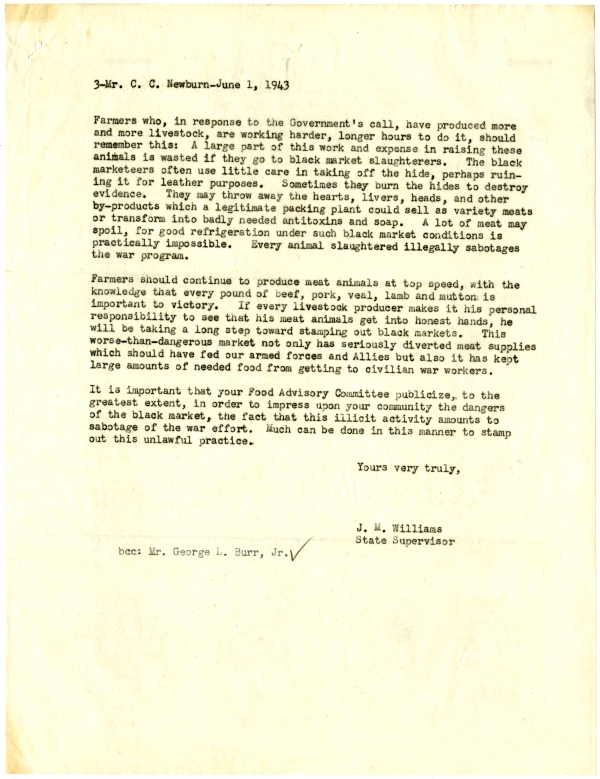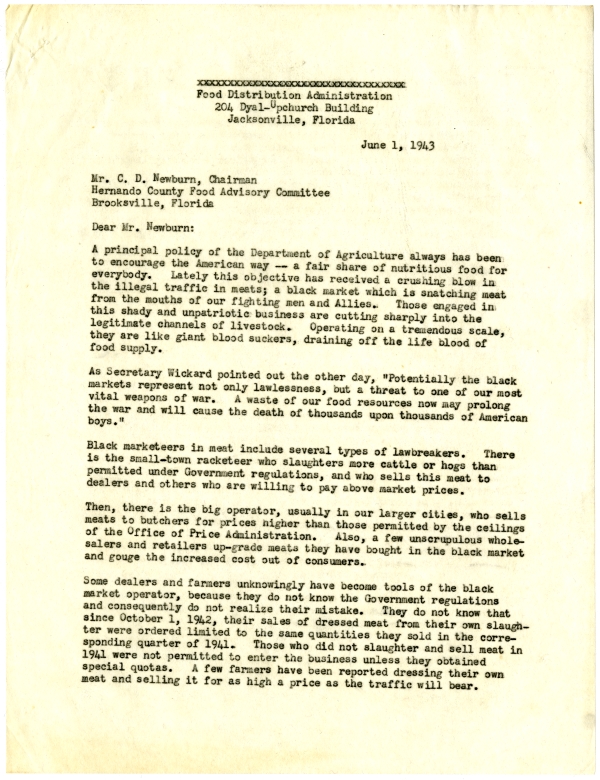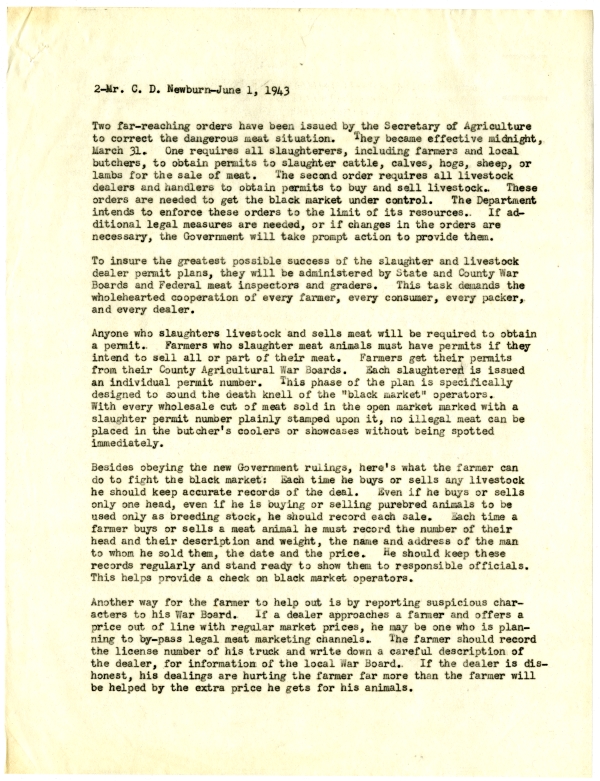Florida Memory is administered by the Florida Department of State, Division of Library and Information Services, Bureau of Archives and Records Management. The digitized records on Florida Memory come from the collections of the State Archives of Florida and the special collections of the State Library of Florida.

State Archives of Florida
- ArchivesFlorida.com
- State Archives Online Catalog
- ArchivesFlorida.com
- ArchivesFlorida.com
State Library of Florida
Related Sites

Description of previous item
Description of next item

Source
Description
Date
Creator
Format
Subjects
Geographic Term
3-Mr. C. C. Newburn-June 1, 1943
Farmers who, in response to the Government’s call, have produced more and more livestock, are working harder, longer hours to do it, should remember this: A large part of this work and expanse in raising these animals is wasted if they go to black market slaughterers. The black marketeers often use little care in taking off the hide, perhaps ruining it for leather purposes. Sometimes they burn the hides to destroy the evidence. They may throw away the hearts, livers, heads, and other by-products which a legitimate packing plant could sell as variety meats or transform into badly needed antitoxins and soap. A lot of meat may spoil, for good refrigeration under such black market conditions is practically impossible. Every animal slaughtered illegally sabotages the war program.
Farmers should continue to produce animals at top speed, with the knowledge that every pound of beef, pork, veal, lamb and mutton is important to victory. If every livestock producer makes it his personal responsibility to see that his meat animals get into honest hands, he will be taking a long step toward stamping out black markets. This worse-than-dangerous market not only has seriously diverted meat supplies which should have fed our armed forces and Allies but also it has kept large amounts of needed food from getting to civilian war workers.
It is important that your Food Advisory Committee publicize, to the greatest extent, in order to impress upon your community the dangers of the black market, the fact that this illicit activity amounts to sabotage of the war effort. Much can be done in this manner to stamp out this unlawful practice.
Yours very truly,
J.M. Williams State Supervisor
Bcc: Mr. George L. Burr, Jr.
Title
Subject
Description
Creator
Source
Date
Format
Language
Type
Identifier
Coverage
Geographic Term
Thumbnail
ImageID
topic
Subject - Corporate
Subject - Person
Transcript
Food Distribution Administration
204 Dyal-Upchurch Building
Jacksonville, Florida
June 1, 1943
Mr. C. D. Newburn, Chairman
Hernando County Food Advisory Committee
Brooksville, Florida
Dear Mr. Newburn:
A principal policy of the Department of Agriculture always has been to encourage the American way – a fair share of nutritious food for everybody. Lately this objective has received a crushing blow in the illegal traffic in meats; a black market which is snatching meat from the mouths of our fighting men and Allies. Those engaged in this shady and unpatriotic business are cutting sharply into the legitimate channels of livestock. Operating on a tremendous scale, they are like giant blood suckers, draining off the life blood of food supply.
As Secretary Wickard pointed out the other day, “Potentially the black markets represent not only lawlessness, but a threat to one of our most vital weapons of war. A waste of our food resources now may prolong the war and will cause the death of thousands upon thousands of American boys.”
Black marketeers in meat include several types of lawbreakers. There is the small-town racketeer who slaughters more cattle or hogs than permitted under Government regulations, and who sells this meat to dealers and others who are willing to pay above market prices.
Then, there is the big operator, usually in our larger cities, who sells meats to butchers for prices higher than those permitted by the ceilings of the Office of Price Administration. Also, a few unscrupulous whole-salers and retailers up-grade meats they have bought in the black market and gouge the increased cost out of consumers.
Some dealers and farmers unknowingly have become tools of the black market operator, because they do not know the Government regulations and consequently do not realize their mistake. They do not know that since October 1, 1942, their sales of dressed meat from their own slaughter were ordered limited to the same quantities they sold in the corresponding quarter of 1941. Those who did not slaughter and sell meat in 1941 were not permitted to enter the business unless they obtained special quotas. A few farmers have been reported dressing their own meat and selling it for as high a price as the traffic will bear.
2-Mr. C. D. Newburn-June 1, 1943
Two far-reaching orders have been issues by the Secretary of Agriculture to correct the dangerous meat situation. They became effective midnight, March 31. One requires all slaughterers, including farmers and local butchers, to obtain permits to slaughter cattle, calves, hogs, sheep, or lambs for the sale of meat. The second order requires all livestock dealers and handlers to obtain permits to buy and sell livestock. There orders are needed to get the black market under control. The Department intends to enforce these orders to the limit of its resources. If additional legal measures are needed, or if changes in the orders are necessary, the Government will take prompt action to provide them.
To insure the greatest possible success of the slaughter and livestock dealer permit plans, they will be administered by State and County War Boards and Federal meat inspectors and graders. This task demands the wholehearted cooperation of every farmer, every consumer, every packer, and every dealer.
Anyone who slaughters livestock and sells meat will be required to obtain a permit. Farmers who slaughter meat animals must have permits if they intend to sell all or part of their meat. Farmers get their permits from their County Agricultural War Boards. Each slaughtered is issued and individual permit number. This phase of the plan is specifically designed to sound the death knell of the “black market” operators. With every wholesale cut of meat sold in the open market marked with a slaughter permit number plainly stamped upon it, no illegal meat can be placed in the butcher’s coolers or showcases without being spotted immediately.
Besides obeying the new Government rulings, here’s what the farmer can do to fight the black market; Each time he buys or sells any livestock he should keep accurate records of the deal. Even if he buys or sells only one head, even if he is buying or selling purebred animals to be used only as breeding stock, he should record each sale. Each time a farmer buys or sells a meat animal he must record the number of their head and their description and weight, the name and address of the man to whom he sold them, the date and the price. He should keep these records regularly and stand ready to show them to responsible officials. This helps provide a check on black market operators.
Another way for the farmer to help out is by reporting suspicious characters to his War Board. If a dealer approaches a farmer and offers a price out of line with regular market prices, he may be one who is planning to by-pass legal meat marketing channels. The farmer should record the license number of this truck and write down a careful description of the dealer, for information of the local War Board. If the dealer is dishonest, his dealings are hurting the farmer far more than the farmer will be helped by the extra price he gets for his animals.
3-Mr. C. C. Newburn-June 1, 1943
Farmers who, in response to the Government’s call, have produced more and more livestock, are working harder, longer hours to do it, should remember this: A large part of this work and expanse in raising these animals is wasted if they go to black market slaughterers. The black marketeers often use little care in taking off the hide, perhaps ruining it for leather purposes. Sometimes they burn the hides to destroy the evidence. They may throw away the hearts, livers, heads, and other by-products which a legitimate packing plant could sell as variety meats or transform into badly needed antitoxins and soap. A lot of meat may spoil, for good refrigeration under such black market conditions is practically impossible. Every animal slaughtered illegally sabotages the war program.
Farmers should continue to produce animals at top speed, with the knowledge that every pound of beef, pork, veal, lamb and mutton is important to victory. If every livestock producer makes it his personal responsibility to see that his meat animals get into honest hands, he will be taking a long step toward stamping out black markets. This worse-than-dangerous market not only has seriously diverted meat supplies which should have fed our armed forces and Allies but also it has kept large amounts of needed food from getting to civilian war workers.
It is important that your Food Advisory Committee publicize, to the greatest extent, in order to impress upon your community the dangers of the black market, the fact that this illicit activity amounts to sabotage of the war effort. Much can be done in this manner to stamp out this unlawful practice.
Yours very truly,
J.M. Williams State Supervisor
Bcc: Mr. George L. Burr, Jr.
Chicago Manual of Style
Williams, J.M. Letter, J.M. Williams to C.D. Newburn regarding black markets, 1943. 1943-06-01. State Archives of Florida, Florida Memory. <https://www.floridamemory.com/items/show/299299>, accessed 1 December 2024.
MLA
Williams, J.M. Letter, J.M. Williams to C.D. Newburn regarding black markets, 1943. 1943-06-01. State Archives of Florida, Florida Memory. Accessed 1 Dec. 2024.<https://www.floridamemory.com/items/show/299299>
AP Style Photo Citation
(State Archives of Florida/Williams)

 Listen: The Latin Program
Listen: The Latin Program
